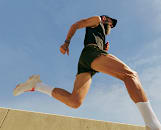
Young777 / E+ via Getty Images
This Is How Regular Exercise Gives You an Energy Boost
Over time, your workouts will make you feel more alert. Here’s how it works.
By Kathleen Felton•
Does Exercise Give You Energy?
How Much Exercise Do You Need for More Energy?
Are Certain Workouts Better Than Others at Boosting Energy?
The Takeaway
If you’re new to exercise or recently started a vigorous training program, it’s not unusual to feel a little sleepy after a workout. But with time and consistency, regular exercise will ultimately give you energy.
Discover more ways to reach your goals with Peloton
That’s right: “Exercise is the best natural way to increase your energy,” says Gabbi Berkow, RD, an exercise physiologist and sports dietitian. Among other benefits, exercise boosts circulation and blood flow, she explains, which can help you feel more invigorated.
Keep reading to learn why exercise can give you more energy, plus whether some workouts are better than others at giving you that boost.
Does Exercise Give You Energy?
The short answer is a resounding yes, experts say: Both in the short and long term, regular exercise can increase energy levels and help you feel alert.
Though more research on the link between exercise and energy is needed, experts think there are a few different reasons for this.
Exercise Leads to More Energy-Generating Cells
Exercise prompts your body to produce more mitochondria in your muscle cells, experts from Harvard Health Publishing explain—and more mitochondria is a good thing, since it essentially increases your body’s energy supplies. (There’s a reason why mitochondria are often referred to as the “powerhouses” of your cells, after all.) Studies even suggest that mitochondrial volume can increase up to 50 percent with prolonged endurance training.
It Improves Circulation
When you work out, blood flow throughout your body increases since your heart is pumping more blood in an effort to deliver oxygen and vital nutrients that power your muscles, Berkow explains. This freshly delivered oxygen also enhances your cells’ ability to produce adenosine triphosphate (ATP), or make energy, she says. Plus, all this extra blood flowing through your body carries nutrients to cells, where they’re also turned into energy.
It Makes us Feel More Energized In the Moment
In addition to giving our bodies a physical jolt, exercise can activate our minds too. “Since exercise is a physical stressor, it stimulates our sympathetic nervous system,” Berkow says. This is the branch of the autonomic nervous system that activates our “fight or flight” response, which then triggers the release of adrenaline and noradrenaline, two hormones that “signal our heart to pump, our brain to be alert, and our muscles to contract,” she says. All this helps explain why you can feel particularly alert during or after a hard workout.
It Helps Us Catch More Zzzs
Regular exercise leads to better sleep. When you adopt a consistent fitness routine, you’re more likely to fall asleep faster and score higher-quality sleep, per the Mayo Clinic. And unsurprisingly, when you get plenty of good-quality sleep, you’ll feel more energetic and refreshed as a result.
Related Articles
How Much Exercise Do You Need for More Energy?
There aren’t tons of studies that look at how much exercise you need for a noticeable energy boost, but the evidence we do have suggests that even short workouts make an impact. “While it’s hard to give an exact prescription, most people are likely to notice an improvement in energy after a short bout of moderate-level exercise—as little as 15–20 minutes, possibly even less,” says Mika Manninen, PhD, an assistant professor of physical education at the School of Health & Human Performance at Dublin City University.
Some research has shown that you may reap the biggest benefits if you exercise for the longer end of that range, though. A 2013 review published in Fatigue: Biomedicine, Health & Behavior looked at how energy levels were impacted by a single workout. Researchers found that while a single workout can make you feel more energetic, a notable decrease in fatigue occurs only when the participants performed low- or moderate-intensity exercise for about 20 minutes or longer.
That said, any amount of exercise can deliver some benefits. A 2023 Cureus review observed that male participants clocked a few extra minutes to their daily sleep tally after just 10 minutes of movement a day. “One workout will definitely boost your energy in the short term,” Berkow says.
Other studies suggest that it’s also key to make exercise a regular habit. In a 2022 Frontiers in Psychology review that Manninen co-authored, researchers noted that participants who performed moderate-intensity exercise for at least six weeks noticed improved fatigue, energy, and overall vitality. “In studies on longer-term exercise, participants typically exercise two to three times per week for eight to 12 weeks, which seems to have benefits beyond the immediate effects,” Manninen says. (And of course, a consistent fitness routine leaves you with many more health advantages beyond increased energy as well.)
Are Certain Workouts Better Than Others at Boosting Energy?
It’s hard to say for certain whether some workouts do a better job at helping you feel energized than others simply because not all types have been thoroughly studied, Manninen explains. But we do have pretty good studies about moderate-intensity aerobic exercise, which consistently shows reliable benefits, he says. In the Fatigue and Frontiers research mentioned above, for example, participants experienced improvement in their energy levels after doing low- to moderate-intensity workouts.
That’s not to say you should only do cardio, however. When you think about whole-body health, balancing resistance workouts such as strength training and bodyweight exercises with aerobic ones (think walking, indoor cycling, running, and other cardio exercises) is a good mix for most people. “Some evidence suggests that resistance training, or a combination of resistance and aerobic training at moderate intensity, might have an even greater positive effect on energy than aerobic exercise alone,” Manninen says. (Psst: You can find thousands of cardio and resistance training classes on the Peloton App.)
Try a Guided Workout Class on the Peloton App
The Takeaway
So, does exercise give you energy? Yes: Research shows that regular exercise leads to an increase in energy levels. Not only can a good workout make you feel energized and alert in the moment, but it also improves circulation and triggers changes at a cellular level that boost energy, making you feel more invigorated. Plus, exercise helps us score higher-quality sleep, so we’re more rested the next day.
Even a super-short workout will do your energy levels some good—but current studies suggest that regular moderate-intensity aerobic workouts lasting 20 minutes or longer deliver reliable benefits. Still, some evidence suggests resistance training might be just as beneficial, if not more beneficial, than cardio alone, so make sure to balance both types of exercise in your fitness routine.

Peloton App
Access thousands of classes with no equipment needed.
This content is for informational and educational purposes only and does not constitute individualized advice. It is not intended to replace professional medical evaluation, diagnosis, or treatment. Seek the advice of your physician for questions you may have regarding your health or a medical condition. If you are having a medical emergency, call your physician or 911 immediately.
Get our latest health stories straight to your inbox
Enter your email to get articles, expert-backed tips, and updates from Peloton sent to your inbox.
By providing your email address, you agree to receive marketing communications from Peloton.
For more about how we use your information, see our Privacy Policy.












